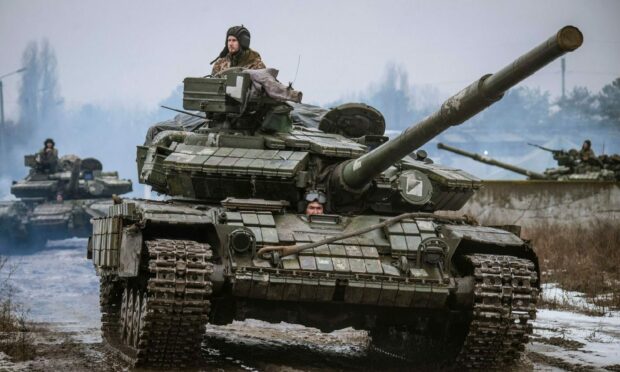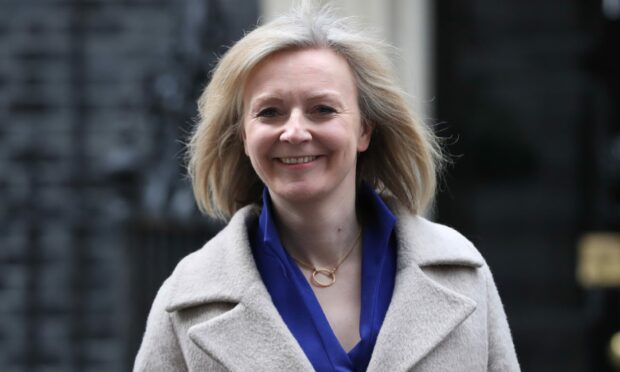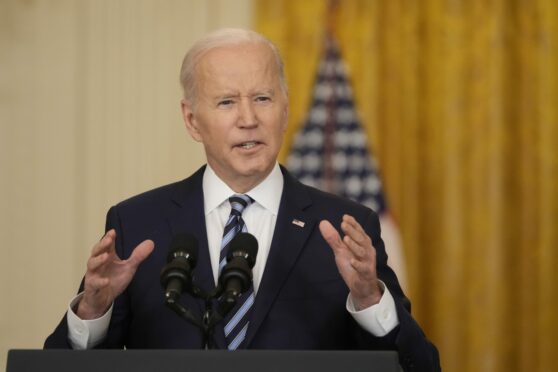Vladimir Putin’s invasion of Ukraine sparked renewed calls for financially painful sanctions on Russia.
It’s hoped the action means there will be no need for European and Nato countries to retaliate with military boots on the ground.
The UK Government has announced a series of financial hits, including removing Russia from an international banking platform called Swift.
Scotland’s First Minister Nicola Sturgeon and Labour leader Sir Keir Starmer called for the UK Government to go even further, while supporting the banking move.
What are the sanctions already imposed, and what more could still be done?
What sanctions has the UK imposed?
After Putin announced the attack on Ukraine, UK Foreign Secretary Liz Trust announced a number of financial sanctions aimed at Russian elites, companies and financial institutions.
The UK Government has also specifically named some individuals and Russian companies it is targeting.
New restrictions on trade and export controls target wealthy Russians’ access to UK banks.
Around 120 companies and people linked to the regime will be hit with asset freezes amounting to hundreds of billions of pounds and travel bans.
Russia’s national airline, Aeroflot, has been banned from UK airspace.
The UK Government says it will also issue sanctions on neighbouring Belarus for its involvement in the “wholly unjustified attack” on Ukraine.
Elsewhere, the European Union has imposed sanctions. But Ukrainian President Volodymyr Zelenskiy called for the EU to go further and ban all Russians from entering the EU.
Who has the UK Government targeted?
The UK Government named some Russian companies and individuals it is specifically targeting with sanctions.
Some of the companies include VTB, Russia’s second-largest bank with assets totally £154 billion, and Rostec, Russia’s biggest defence company which exports more than £10bn in arms.
Among the individual wealthy Russians the UK is specifically targeting, the government has named five, including:
- Kirill Shamalov, Russia’s youngest billionaire and Putin’s former son-in-law
- Petr Fradkov – head of Promsvyazbank and son of the former head of Russian Foreign Intelligence
- Yury Slyusar, director of United Aircraft Corporation
- Elena Aleksandrovna Georgieva, chair of Novikombank
- Denis Bortnikov, deputy president of VTB bank.
Denis is the son of Alexander Bortnikov, the head of the Federal Security Service which was responsible for the Novichok poisoning of Alexey Navalny.
Foreign Secretary Liz Truss said: “We will squeeze Putin’s regime and all those close to him responsible for its appalling attack on Ukraine.”
She added: “We will not rest until Russia’s economy has been degraded and Ukraine’s sovereignty and territorial integrity restored.”
What is Swift and why are countries split?
Despite the sanctions already announced, the UK Government is pushing for Russia to also be removed from Swift, more formally known as the Society for Worldwide Interbank Financial Telecommunications.
It is the main secure messaging system banks use to make rapid and secure cross-border payments, allowing international trade to flow smoothly.
In 2020, about 38 million transactions were sent over the Belgian-based platform every single day.
Since the Russian invasion, Ukraine’s Foreign Minister Dmytro Kuleba has called on the international community to eject Russia from Swift, saying “blood will be in the hands” of those who block such a move.
Ms Sturgeon said: “If the current situation doesn’t make the maximum possible sanctions – including exclusion from Swift – necessary and urgent, it’s hard to imagine what would.
“This is not the time for half measures.”
If the current situation doesn’t make the maximum possible sanctions – including exclusion from SWIFT – necessary and urgent, it’s hard to imagine what would. This is not a time for half measures. #StandWithUkraine https://t.co/IY5gg13GCx
— Nicola Sturgeon (@NicolaSturgeon) February 25, 2022
US opposition to banking ban
The Biden administration says a ban on Russia using Swift could hurt its allies as well as Russia – something the US wants to avoid.
Other countries which rely on Russian exports are also more reluctant to call for Russia to be barred from Swift.
German Chancellor Olaf Sholz opposes the move.
He said: “It’s very important that we decide on measures that have been prepared in recent weeks and reserve everything else for a situation where it is necessary to do other things as well.”
The head of Russian bank VTB has also said he could use other channels to make international transactions if Russia is barred from Swift, suggesting this sanction would not have the big effect some hope it might.
Russia could also process payments through countries that have not yet imposed sanctions, such as China.


